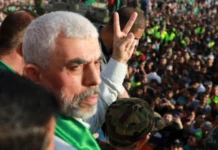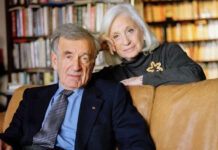Everything in the social world begins with the individual human being. This includes terrorism. Ultimately, Israeli security planners will need to acknowledge that the jihadist adversary, Sunni or Shiite, whether in Gaza or Lebanon, desperately seeks one form of power above all others. This cowardly goal is “power over death.”
The core issues are being ignored in Jerusalem and also in Washington. To wit, at a moment of unique vulnerabilities, Israel’s political leaders continue to focus on the symptoms of terror-violence rather than on its causes. The plausible result of such a misdirected focus is fully predictable. But what exactly needs to be better understood?
There is a tangible answer. Three key concepts could point the way. These are death, time and immortality.
Death, Time and Immortality: The Unexamined Intersections
For planners in Jerusalem, background is important. What can the three concepts of death, time and immortality teach us about the world system’s sovereignty-centered landscape, both present and future? Taken as a whole, how should our self-annihilating planet allow itself to advance beyond the visceral explanations and gratuitous rancor of traditional geopolitics?
Capable counter-terrorism analysts should start with the individual human being, with the microcosm in all its universalized expressions. Though uniformly disregarded and de facto invisible, power over death represents the ultimate political reward for faith-based compliance. Generally, while it is only uttered sotto voce, in whispers, there can be no greater power. By definition, “power over death” offers the utterly incomparable promise of immortality.
“It is through death,” says Jewish philosopher Emmanuel Levinas, “that there is time….” It follows, among many other things, that a state or sub-state which can allegedly enhance the promise of personal immortality could also heighten the promise of time. Could there possibly be any more enviable forms of power?
There are further questions. To begin, what can such dense abstraction have to do with an Israeli struggle for survival? These are not easy concepts to understand, especially in the context of imperatively continuous preoccupations with jihadist personalities and Islamist rancor.
If chronology is contingent upon death, a prior question will need to be posed: How does one actually gain tangible power over death, and what does such gain have to do with the fate of a particular state or nation? It is precisely with this question in mind that science-based terrorism inquiries should be undertaken in Israel.
Before venturing proper answers to specific operational questions, Israeli and also American strategists should distinguish between authentic power and the expectation that such power must always lie in a presumed obeisance to God. Ritualistically, all humans, not just jihadist forces of the Middle East, seek palpable links to the Divine. In identifying humankind’s pertinent links – those connections that are prior to acquiring power over death – the most evident path involves religious faith. Though every one of the world’s major religions offers its adherents certain alluring promises of immortality in exchange for faithful belief, only jihadist terrorists link “power over death” to the intentional slaughter of innocents.
For Hamas, Hezbollah and Iran, moreover, it is a link proudly publicized.
In world politics, the State of Israel remains targeted by terrorists who seek “martyrdom.” Hamas, Islamic Jihad, Fatah and Hezbollah seek “power over death” more sincerely than they seek “recovering territory” or a Palestinian state. For these terrorists, the “heroic armed struggle” is about satisfying darkly personal and primal wants. Ipso facto, Israel’s negotiations over a Palestinian state will always be undertaken without any correlative security benefits.
More than anything else, the Hamas, Islamic Jihad, and Hezbollah terrorist seeks “power over death.” The problem for Israel, and also for the United States, is that this supreme power is contingent on the mass murder of designated “unbelievers.” The most conspicuously despised “unbeliever” is not “The Zionist,” but “The Jew.” This is because the jihadist’s “heroic armed struggle” is never about geo-political settlements or compromises. It is always about God, immortality and a defiling vision of “ecstasy.”
“I believe.”
On occasion, the doctrinal priority “I believe” (a phrase taken from Oswald Spengler’s post-World War work The Decline of the West) can demand a faith-confirming end to the individual “martyr’s” life on earth. At other times, assorted high-minded doctrines of charity, caring and compassion notwithstanding, this priority can require the rape, torture and/or killing of “unbelievers,” “heathen,” “apostates.” As convenient subterfuge, the alleged intention of this patently twisted requirement is to safeguard “the one true faith.”
Jerusalem and Washington still fail to understand what is conceptually imperative. Jihadist terrorism is a form of religious sacrifice. Here, whatever special circumstances may be involved, Reason gives way to Unreason. Significantly, such lethal surrenders are no less likely in an Age of Science than in an earlier Age of Belief.
Cumulative hopes for a death-centered individual rising “above mortality” can have critical consequences for the “macrocosm,” for planet earth in its entirety. In the nineteenth century, at his posthumously published Lecture on Politics (1896), German historian Heinrich von Treitschke observed: “Individual man sees in his own country the realization of his earthly immortality.” Earlier, German philosopher Georg Friedrich Hegel had opined in his Philosophy of Right (1820) that the state represents “the march of God in the world.”
These widely-cited view tie loyalties to the state to the promise of “power over death.” By definition, this must always be a delusional promise. Whenever the historian looks beyond the distracting shadows of true images, he discovers no compelling evidence of such promise having been kept.
In related matters, faith and science intersect with variously coinciding considerations of law. The “deification” of Realpolitik, a transformation of ideology from simple principle of action to sacred end in itself, drew its germinal strength from the doctrine of sovereignty. Conceived in the sixteenth and seventeenth centuries as a juridical principle of internal order, this doctrine underwent several far-reaching metamorphoses, whence it also became the justifying legal rationale for international anarchy. This decentralization was identified by classical political philosophers as a “state of nature.”
When it is understood in terms of modern international relations, the doctrine of sovereignty encourages the refractory notion that states (a) lie above and beyond any legal regulation in their interactions with each other, and (b) act rationally whenever they seek benefits at the expense of other states. “O my soul,” warns the classical poet Pindar, “do not aspire to immortal life but exhaust the limits of the possible.”
Considered by itself, immortality remains an unworthy and unseemly human goal, both because it is scientific nonsense and because it fosters such endlessly injurious human behaviors as war, terrorism, genocide and “martyrdom.” The dignified task should not be to remove individual human hopes to soar above death, but to “de-link” this futile search from certain murderous human behaviors.
De-Linking Death Fear and Ecstasy from Terror-Crimes
How should Israeli and American planners best proceed with such a herculean task? This is not an easy question. The wish to immortality and ecstasy is so deeply animating and universal that it can never be dispelled by science or logical argument. What unreason could never accomplish, remarks Friedrich Nietzsche in Zarathustra, could never be accomplished by reason.
Philosopher Karl Jaspers writes in Reason and Anti-Reason in our Time (1952): “There is something inside all of us that yearns not for reason but for mystery – not for penetrating clear thought but for the whisperings of the irrational….” The most seductive of these irrational whisperings are those that offer to confer a distinctively selective power over death. It is from the expressed criteria of such “selection” that far-reaching evils can “be born.” This is because “power over death” demands the “sacrifice” of certain despised “others.” Jihadist terror against Israel, it ought never be over looked, is ultimately a form of religious sacrifice.
The underpinnings of daily news events in the Middle East, Israeli planners should observe, are rooted in complex conceptual intersections of death, time and immortality. It is only with a more determined understanding of these intersections that Israel can meaningfully protect itself from murderers who link criminal-terrorism to presumed ecstasies (including deviate sexual crimes as took place on October 7) and primal fantasies of eternal life.
For Israel. geopolitics should always be understood as a second-order activity, a mere reflection of what is authentically causal. For now, Israel’s enemies – state and sub-state – continue to thrive on a vast intellectual emptiness, on the evident delusion that mass killing of “others” can offer powers over death.
This delusion is not just barbarous and medieval; it is also futile.
Terrorism and Time
“Is it an end that draws near,” inquires Karl Jaspers in Man in the Modern Age (1951) “or a beginning.” The insightful answer, one which lies far beyond any measuring hands of watches or clocks, is by no means apparent. Yet, determining this challenging answer has become a fundamental expectation of global political destiny. For the world as a whole, not just Israel and the United States, nothing could be more important.
To survive as a species, not only as singular states, humankind will need to rise above the unrewarded hazards of geopolitics. Foreseeably, countless residents of planet earth will continue to regard “power over death” as the highest conceivable form of power. The flesh-and-blood consequences of such ubiquitous anti-reason could soon rival or even exceed this planet’s prior encounters with total war.
To look suitably beyond reflections, Israeli strategic thinkers and planners must first acknowledge that Islamist foes are further animated by two compelling needs: meaning and belonging. These needs represent values that are additional to ecstasy and immortality. Taken together, in varying but indeterminable proportions, they identify the conceptual foundations of anti-Israel terror-violence. Ipso facto, all ongoing Israeli military efforts against Hamas, Hezbollah, Islamic Jihad, Fatah and Iran should take operational note of these additional adversarial drives.
In his modern philosophical classic, Being and Time (1953), Martin Heidegger laments what he calls (in German) das Mann, or “The They.” Drawing fruitfully upon earlier seminal insights of Nietzsche, Kierkegaard, Jung and Freud, Heidegger’s “The They” represents the ever-present herd, crowd, horde or mass, an “untruth” (the term favored by Danish philosopher Soren Kierkegaard) that can all-too-quickly suffocate needed intellectual growth. Regarding Heidegger’s always-threatening “The They,” the crowning human untruth lies in (1) “herd” acceptance of immortality at institutional and personal levels; and in (2) herd encouragement of the notion that personal power over death is sometimes derivative from nation-states. History reveals that this can become an insidious notion. Presently, this notion can be associated with membership in such sub-state terror groups as Hamas, Islamic Jihad, Fatah and Hezbollah.
There is more. Any reassuring hopes about the potential for personal immortality are contingent on a specific state or sub-state’s “sacredness.” More precisely, only membership in a presumptively sacred group can confer “life-everlasting.”
Before civilized nations such as Israel could be rescued from accumulating jihadist terror crimes – crimes that could soon involve certain unconventional weapons – scholars and policy-makers will require a more theoretical understanding of potentially lethal intersections. These intersections represent variously complex and hard-to-fathom fusions of mass murder, belligerent nationalism and metaphysical fear. It follows, among other things, that current Islamist operations in Gaza (Iran/Hamas/Fatah/Islamic Jihad) and Lebanon (Iran/Hezbollah) should be understood in Jerusalem and in Washington at more challenging intellectual levels. It is only with such an expanded theoretical understanding that operationally pragmatic counter-terrorist measures could expectedly succeed.
————–
Louis René Beres is Emeritus Professor of International Law at Purdue University. Hewas educated at Princeton (Ph.D., 1971) and is the author of twelve major books and several hundred journal articles dealing with international relations and international law. A frequent contributor to Israel National News, his publications have appeared in The Harvard National Security Journal, The Atlantic; US News & World Report; The National Interest; Yale Global Online; Modern Diplomacy; World Politics (Princeton); The Brown Journal of World Affairs; The Israel Journal of Foreign Affairs; The New York Times; The Hudson Review; and more. He was born in Zürich at the end of World War II.


























